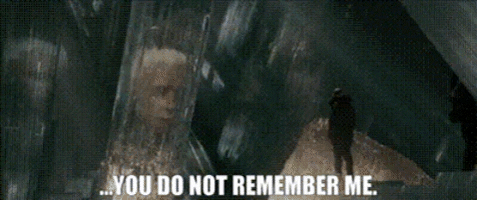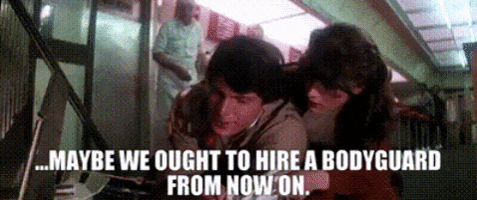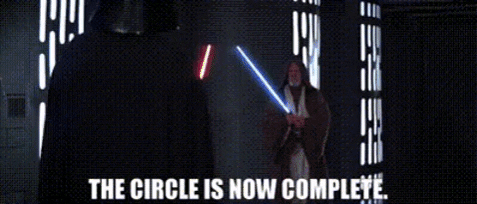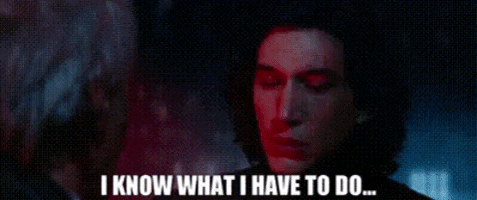“Superhero stories were written to be universal and inclusive, but often they’ve been aimed, it must be said, at boys and young men. Perhaps that’s why a mainstream myth has developed in which comic-book superheroines are all big-breasted Playboy girls with impossibly nipped waists and legs like jointed stilts in six-inch heels. But while it’s true that superhero costumes allow artists to draw what is effectively the nude figure in motion, there have in fact been more female superhero body types than male.
The first superheroine, you may be surprised to learn, was not a voluptuous cutie in thigh boots but a raw-faced middle-aged housewife called Ma Hunkel, who wore a blanket cape and a pan on her head in her debut appearance, All-American no. 20, 1940. A harridan with the build of a brick shithouse she was the first “real-world” superhero—with no powers, a DIY outfit, and a strictly local beat—and the first parody of the superhero genre all in one. Ma Hunkel, aka the Red Tornado, was a Lower East Side lampoon of Siegel and Shuster’s lofty idealism.
The mainstream has forgotten Ma Hunkel, although, like all the rest, she’s still a part of the DC universe and now has a granddaughter named Maxine Hunkel, a talkative, realistically proportioned, and likeable teenage girl who also challenges the superbimbo stereotype. But, of course, the comic-book industry in the throes of the war machine did churn out its fair share of pinup bombshells and no-nonsense dames with names like Spitfire and Miss Victory, or the strangely comforting Pat Parker, War Nurse.
With no particular ax to grind against the Axis forces, Pat Parker was driven only by her desire to dress up like a showgirl and take to the battlefields of Western Europe on life-threatening missions of mercy.
She was prepared to take on entire tank divisions with a refugee quivering under each arm. What made her tank-battling activities especially brave was the fact that this war nurse had no special powers and wore a costume so insubstantial, there could be nothing secret about her lunch, let alone her identity. But, absurd as she may seem, she did her best to exemplify the can-do, Rosie the Riveter spirit of those women who were “manning” the home front.
And then there was the most famous superheroine of them all. Wonder Woman was the creation of William Moulton Marston, the man who, not incidentally, invented the controversial polygraph test apparatus, or lie detector, that is still in use today.
Marston was a professor at Columbia and Tufts universities, and Radcliffe College —and a good one, according to accounts of the time— and the author of several respected works of popular psychology. Like other forward thinkers, Marston saw in comics the potential to convey complex ideas in the form of exciting and violent symbolic dramas. He described the great educational potential of the comics in an article titled “Don’t Laugh at the Comics,” which appeared in the popular women’s magazine Family Circle in 1940 and led to his getting hired as an educational consultant at DC-National.
Marston coupled his ideas with an unorthodox lifestyle: his wife, Elizabeth, was also a psychologist, and is credited with having suggested a superheroine character.
Both were enthusiastic proponents of a progressive attitude toward sex and relationships. They shared a mutual lover, a student of Marston’s named Olive Byrne, said to be the physical model for the original Harry Peter drawings of Wonder Woman. Together, Marston and Peter (with indispensable input from Elizabeth and Olive) developed a fantasy world of staggering richness.
For sheer invention, for relentless dedication to the core concept, the Wonder Woman strip far surpassed its competitors. But unlike traditional pinups, the girls of Wonder Woman were athletic and forceful.
They wore tiaras and togas while they engaged in violent gladiatorial contests on the backs of giant, genetically engineered monster kangaroos.
Wonder Woman was traditionally sexy—there were pinup shots—but in most panels, she yomped and stomped like some martial arts majorette, outracing automobiles for fun.
1941’s “Introducing Wonder Woman” began when an air force plane crashed on an uncharted island inhabited exclusively by beautiful scantily clad women capable of carrying the full-grown air force pilot “as if he were a child.”
The man, Captain Steve Trevor of US Army Intelligence, was the first to ever set foot on Paradise Island, and within moments, the queen’s daughter, Princess Diana, had fallen in love.
A two-page illustrated-text section revealed the history of the Amazons since their slavery at the hands of Hercules. Encouraged by their patron goddess Aphrodite, they liberated themselves and set sail for a magical island where they could establish a new civilization of women, far from the cruelty, greed, and violence that typified “Man’s World.”
On Paradise Island, the immortal women set about fashioning their fabulous alternative to patriarchal, heliocentric society.
In this first issue, Hippolyta, the queen of the Amazons, consulted apparitions of Aphrodite and Athena, who clarified that Trevor had been sent deliberately by the gods.
It was time, apparently, for the Amazons to emerge from seclusion and join the worldwide struggle against Axis tyranny.
Trevor had to be sent home to complete his mission against the enemy—but he was not to return alone.
“YOU MUST SEND WITH HIM THE STRONGEST OF YOUR WONDER WOMEN!—FOR AMERICA, THE LAST CITADEL OF DEMOCRACY, AND OF EQUAL RIGHTS FOR WOMEN, NEEDS YOUR HELP!”
A contest was declared to identify the most appropriate candidate.
Tests included outrunning a deer and culminated in the favorite sport of these immortal ladettes: bullets and bracelets. A kind of Russian roulette, the game saw the final contenders facing one another with loaded revolvers (where the staunchly antiwar Amazons managed to get hold of working firearms remains a mystery). Bullets were fired at the opponent, who was obliged to deflect them with her bracelets in order to win the game. The loser took a flesh wound to the shoulder.
In the end one champion remained: a masked brunette, revealed in a not entirely unexpected twist to be Princess Diana herself.
“AND SO DIANA, THE WONDER WOMAN, GIVING UP HER HERITAGE AND HER RIGHT TO ETERNAL LIFE, LEAVES PARADISE ISLAND TO TAKE THE MAN SHE LOVES BACK TO AMERICA—THE LAND SHE LEARNS TO LOVE AND PROTECT, AND ADOPTS AS HER OWN!”
However, within this world—and supplying it with depth and enticing richness—lurked barely hidden libidinal elements.
To begin with, it has to be said that these Amazons were drawn to be sexy.
Whereas Siegel rendered Superman in dynamic futurist lines and Bob Kane gave Batman the look of a Prague potato print, Peter brought a flowing, scrolling quality to his drawings of superwomen in action and at play. Everything was curved and calligraphic. The lips of his women were modishly bee stung and glossy, as if to suggest that Hollywood-style glamour makeup never went out of vogue among the warrior women and philosopher princesses of Paradise Island.
However, as you may expect in a society of immortal women cut off from the rest of the world since classical antiquity, the diversions of the Amazons turned out to be somewhat specialized, to say the least.
As the strips developed, Marston’s prose swooned over detailed accounts of Amazonian chase and capture rituals in which some girls were “eaten” by others.
Moreover thousands of years of sophisticated living without men had bled the phallic thrust out of sexuality, leaving the peculiar, ritualistic eroticism of leash and lock.
Marston and Peter built slavery and shackles into “Meet Wonder Woman,” and as the strip progressed, the bondage elements became more overt, increasing sales.
For instance, chief among Wonder Woman’s weapons of peace was a magic lasso, which compelled anyone bound in its coils to tell the absolute truth and only the truth—shades of Marston’s polygraph.
Moreover, it wasn’t long before she was breathlessly demonstrating the joys of submission to “loving authority”: A Nazi villain’s slave girls were released in one story, with no idea what to do with their lives out of captivity.
Wonder Woman’s solution was to allow them to continue to express their nature as born slaves by relocating to Paradise Island, where they could enjoy bondage under the loving gaze of a kind mistress instead of the crop-cracking Hitler-loving Paula von Gunther.
The flipside of the Amazons’ essentially benign and formalized endorsement of healthy S/M was the dungeon world of sadistic bondage, humiliation, and mind control that existed in the world beyond Paradise Island.
These were crystallized in the form of Doctor Poison, a twisted dwarf in a rubber coat. Wielding a dripping syringe, Poison hated women and loved to humiliate them. In a surprising twist, “he” was revealed to be a mentally ill woman acting out of her frustrations.
The women of Paradise Island embodied an enticing blend of the politically right-on and the libidinous. As such, they were exemplars of a newfangled twentieth-century creed that was the same old bohemian “free love” with a new lexicon culled from psychoanalytical theory and the pink and squeezy world of dreams and desire.
Theirs was a kind of radical Second Wave separatist feminism where men were forbidden and things could only get better as a result.
Indeed, in Marston’s feminine paradise, happiness and security were in far greater supply than elsewhere in the superworld.
In looking at other superhero comics he had noted, “it seemed from a psychological angle that the comics’ worst offence was their blood-curdling masculinity. A male hero, at best, lacks the qualities of maternal love and tenderness which are as essential to the child as the breath of life.”
And so, while Batman was a brooding orphan, and the destruction of Superman’s Krypton had robbed him of his birth parents, the magnificent scientists Jor-El and Lara, Wonder Woman could ride her invisible plane down the rainbow runway to Paradise Island and check in with Mom any time she wanted.
Queen Hippolyta even had a magic mirror that allowed her to observe her daughter at any location on Earth.
It was closed-circuit television by any other name, but in late 1941, Hippolyta’s magic mirror could only be a product of imaginary feminist superscience.
There were some similarities with Wonder Woman’s male predecessors. Like Superman, in his way, Wonder Woman fearlessly championed alternative culture and a powerful vision of outsider politics. And, like Batman, she was thoroughly the progressive sort of aristocrat.
She preached peace in a time of war, although she was as eager as any other superhero to tackle her fair share of Nazis.
Unlike the essentially solitary Batman and Superman, Wonder Woman had a huge cast of friends. Her allies, the Holliday Girls of Beta Lamda, were a rambunctious group of sorority sisters fronted by the immense, freckled redhead Etta Candy.
As the gorgeous Wonder Woman’s inevitable fat pal, Etta’s positive energy and physicality added an earthiness and humor that complemented Diana’s cool grace and perfect poise.
When Marston died of cancer in 1947, the erotic charge left the Wonder Woman strip, and sales declined, never to recover. Without the originality and energy that Marston’s obsessions brought to the stories, Wonder Woman was an exotic bloom starved of rare nutrients.
Once the lush, pervy undercurrents were purged, the character foundered. The island of Themiscyra was scraped clean of any hint of impropriety, and all girl-chasing rituals ceased, along with reader commitment to the character.
It wasn’t long before Wonder Woman was coming across as an odd maiden aunt—a disturbing cross between the Virgin Mary and Mary Tyler Moore; but Elizabeth and Olive, her inspirations, continued to live together.
The unconventional, liberated Elizabeth was one hundred years old when she died in 1993, the true Wonder Woman of this story.”











